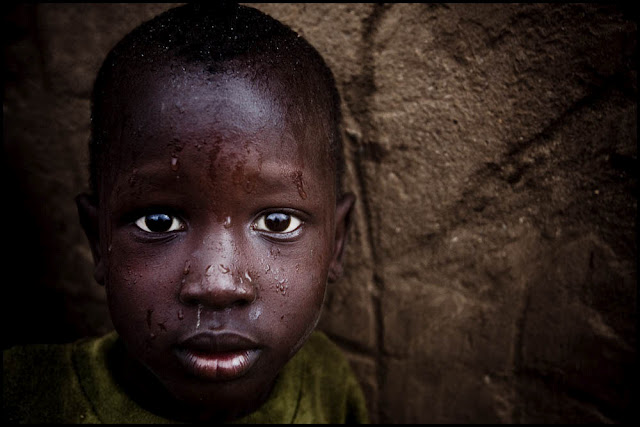-
Women, Water and Conflict as Development Priorities Plus Some Geoengineering Context
›September 24, 2010 // By Geoffrey D. DabelkoHere are some useful links to environment, population, and security work that recently crossed my desk.
• NYU’s Richard Gowan dissects UK development minister Andrew Mitchell’s encouraging speech identifying conflict-affected states as special DFID priorities. Gowan pulls out highlights from the speech and parses NGO reaction to it on Global Dashboard.
• Council on Foreign Relations’ Isobel Coleman provides five practical suggestions for tapping into women as the “new global growth engine,” on Forbes.
• The Aspen Institute announced its Global Leaders Council for Reproductive Health this week. Their goal: meeting unmet demand for family planning services by 2015 on the MDG schedule. That is over 200,000,000 women who want services but do not have access.
• I’m heartened to see the U.S. Senate pass the Senator Paul Simon Water for the World Act. Hoping the House will follow suit. Last time Congress passed legislation on water, sanitation, and health priorities, the 2005 Senator Paul Simon Water for the Poor Act enjoyed overwhelming bipartisan support.
• Colby historian Jim Fleming, writing in Slate, puts the increasing fascination with geoengineering as a climate response “option” in some sobering historical context. “Weather as a Weapon: The Troubling History of Geoengineering” is the short read. Tune in to hear Jim present the book length version, Fixing the Sky, at the Wilson Center, October 6th at 10:30 am EST.
Follow Geoff Dabelko (@geoffdabelko) and The New Security Beat (@NewSecurityBeat) on Twitter for more population, health, environment, and security updates. -
Climate Science, Military and Gender Roles, and the Tibetan Plateau
›September 14, 2010 // By Geoffrey D. DabelkoHere are some useful links to environment, population, and security work that recently crossed my desk.
• Need a break from the raging debate set off by Halvard Buhaug’s Proceedings of the National Academy of Sciences quantitative-based critique of climate and African civil war linkages (or lack thereof)? Check out some of the correlations Cullen Hendrix and Idean Salehyan of University of North Texas find in their piece “After the Rain: Rainfall Variability, Hydro-Meteorological Disasters, and Social Conflict in Africa.”
• A German military think tank report worries about the economic and political implications of peak oil over a relatively short time frame.
• Militaries’ humanitarian responses to extreme weather events rather than actual shooting wars are the focus of “The Coming Conflicts of Climate Change,” by U.S. Navy Foreign Area Officer Michael Baker. Baker is writing for the Council on Foreign Relations as one of their International Affairs Fellows.
• Oxfam America and IUCN staff experts call for greater consideration of different gender roles in addressing climate change. UN climate institutions are targeted in the IPS story.
• Journalist Steve Solomon highlights the high politics of transboundary water in Asia with a piece in Forbes. China’s control of the Tibetan water tower with massive dam building amps up the pressure in South and Southeast Asia.
• Canadian scholar Eric Kaufmann’s book, Shall the Religious Inherit the Earth? breaks down relative population growth rates between the religious and the secular. One is high, one is below replacement level. So far the book is only published in Europe but you can get it from Amazon UK.
• The highly respected science journal Nature editorializes against the rising tide of loud anti-science demagoguery. Strong words on the U.S. political context.
Follow Geoff Dabelko (@geoffdabelko) and The New Security Beat (@NewSecurityBeat) on Twitter for more population, health, environment, and security updates. -
Megatrends: Embracing Complexity in Today’s Population and Migration Challenges
›March 29, 2010 // By Geoffrey D. DabelkoForeign Policy’s Elizabeth Dickinson recently sat down with UN High Commissioner for Refugees António Guterres for a wide-ranging interview on the global refugee crisis. Yet a strong theme emerges across the continents: The complexity of today’s conflicts belies either easy or quick solutions.
-
Is the Melting Arctic a Security Challenge or Crisis? The View From Russia and Washington
›March 24, 2010 // By Geoffrey D. DabelkoIn his opening remarks at the Security Council of the Russian Federation’s meeting on climate change last week, Russian President Dmitry Medvedev framed climate change as a force for increased competition and “disputes between countries.” Unsurprisingly, he focused on the Arctic region and what he called the “inadmissible” and “unfair” threats to Russia’s access to the region’s resources:
We must not forget either that climate change can give rise not only to physical change, change in the nature around us, but can also see the emergence of disputes between countries over energy exploration and extraction, the use of marine transport routes, bioresources, and shortages of water and food resources. The countries bordering the Arctic region are already actively engaged in expanding their research, economic, and even military presence in the Arctic. Unfortunately, in this situation, we are seeing attempts to limit Russia’s access to exploring and developing Arctic energy deposits, which is inadmissible from a legal point of view and unfair in terms of our country’s geographical location and very history.
His reference to “shortages of water and food resources” fits squarely within the increasingly common view of climate change’s potential as a “conflict accelerant” (see, e.g., the U.S. Department of Defense’s 2010 Quadrennial Defense Review) or “threat multiplier” (as in CNA’s National Security and the Threat of Climate Change and statements from representatives of the UK and EU foreign offices).
But his Arctic comments sounded different than what I’ve been hearing in Washington. The Arctic rightfully gets a lot of attention for alarming rates of physical change, newly accessible resources, and potential new shipping routes. Yet remarks at a recent spate of Arctic climate and security discussions suggest officials in Washington view the geopolitical and trade issues more as “challenges” than “crises.”
For example, last month at the Stimson Center, and just yesterday at the Johns Hopkins University Applied Physics Lab, the U.S. Navy’s director of Task Force Climate Change and oceanographer, Rear Admiral David Titley, used “challenge” rather than “crisis” to depict the security situation in the far North. At numerous panels, officials and experts expressed confidence that the Arctic Council and related institutions are forums robust enough to manage current and future disputes.
Ironically, one of those key institutions is UNCLOS, the Law of the Sea treaty, which has been ratified by 157 countries, but not the United States. U.S. military and civilian officials alike see ratification as a key step for the United States to represent its interests in these critical multilateral settings. Nevertheless, we can anticipate some knee-jerk demagoguery about the treaty ceding U.S. sovereignty to the United Nations, so the Senate is unlikely to take up the issue until after the fall 2010 elections.
I want to thank friend and colleague Alexander Carius, co-director of Adelphi Research, for calling President Medvedev’s speech to my attention.
Photo: Russian President Dmitry Medvedev, courtesy Flick user World Economic Forum -
Making the Connections: An Integration Wish List for Research, Policy, and Practice
›January 3, 2010 // By Geoffrey D. DabelkoNew York Times columnist Nick Kristof is likely a well-known voice to New Security Beat readers. His ground-level development stories from around the world expose a range of neglected issues that usually struggle for mainstream media coverage: maternal health, microcredit, human trafficking, family planning, sanitation, micronutrients, and poverty, among others.
Kristof brought many of these threads together Half the Sky, a book he coauthored with his wife Sheryl WuDunn. I asked about the challenges of addressing these connected problems when I interviewed the couple and two frontline White Ribbon Alliance maternal health practitioners this fall at the Wilson Center.
Now Kristof is asking readers to suggest topics for him to cover in 2010. My suggestions to him are actually a wish list for the wider development community. In short, how can scholars, policymakers, practitioners, and communities better research and analyze these connected topics and then fashion integrated responses? I posted my comment on Kristof’s blog, On the Ground (and I ask your indulgence for the less than polished writing):I’d love for you [Kristof] to explore the challenge of integration from both problem and response perspectives. People in poverty lead integrated lives (just like we wealthier folks do), face connected challenges, and need integrated or multiple responses. Single-sector programs may deliver quicker, more obvious, and/or more countable impacts (or parallel advantages for single-discipline research endeavors). Yet time and time again we see such approaches only partially meeting needs or not meeting them sustainably. There is also a persist danger of undercutting others’ efforts and/or creating high opportunity costs.
These questions topped my wish list to Kristof last night while procrastinating on other writing. What would be on your wish list for Kristof, the development community, or even just New Security Beat? We at the Environmental Change and Security Program (ECSP) would love to hear from NSB readers so we can keep covering the questions that interest you.
So which integrated research, policy analysis, or field-based programs explicitly recognize that trends that appear to be on the periphery are hardly peripheral? At the same time, if programs try to be all things to all people, they can become bloated, unrealistic, and/or unsustainable.
For example, are the Millennium Villages examples of the former or the latter? How about the much smaller programs under the population-health-environment grouping? What went wrong with Campfire programs to cause so many to abandon the approach? Have the loosened restrictions on what constitutes an appropriate PEPFAR intervention addressed this integration problem, or will politics (exclusion of family planning in PEPFAR, for example) mean we cannot capture the full benefits of integration?
And the big Kahuna: how is the rhetoric and analytical argument around the 3Ds (defense, development, and diplomacy) made real and practicable in the field (as in the United States we anticipated early this year the results of the Quadrennial Defense Review (QDR), Quadrennial Diplomacy and Development Review (QDDR), and Presidential Study Directive on Global Development Policy (PSD))?
And finally, does our (read donors’) penchant for measuring impact and quantifying results force us to narrow interventions to the point of missing key connections in cause and effect of the problems we are trying to address? Is there a better mix of defining and measuring success that captures the challenges and benefits of integration? -
Price of Coal Surges!
›December 23, 2009 // By Geoffrey D. DabelkoThe price of coal surged this morning as a new buyer entered the market. A high-volume rush order came in from the North Pole in the last few hours, accounting for the surge. Shaking his head, one dazed trader said the size of the order was equivalent to the yearly total of a medium-size country with no green energy sector.
When pressed to reveal the source of the demand, traders grudgingly admitted a white-bearded man clad in red had suddenly appeared, agitated and mumbling about those who simply couldn’t be good for goodness’ sake. He had come straight from the Bella Center and was scrolling through a long list of names on his Blackberry. “It just keeps getting longer and longer!” he cried. With a bottle of Carlsberg in hand, he made some final calculations and proclaimed he had a sudden need for coal ready for delivery in two day’s time.
Satisfied he’d have adequate supplies ready for pickup in every country from the North to the South, he made his way up to the roof of the trading house. Those close at hand overheard him say, “Good night to you all, but I won’t see you next year. I’ll have to come up with something else for these naughty types. They will probably just burn this stuff.”
“At least Mexico City will be warmer!”
Photo: Courtesy David Hawxhurst, Woodrow Wilson Center -
NATO Says Don’t Fight the Planet
›Climate and security are under discussion today in Copenhagen at the Danish government’s side event, which brings together heavyweights such as NATO Secretary-General Anders Fogh Rasmussen, Swedish Foreign Minister Carl Bildt, African Union Chair Jean Ping, and Danish Foreign Minister Peter Stig Møller.
Fogh Rasmussen, the former prime minister of Denmark, delivered his remarks the new-fashioned way: today’s Huffington Post. He says NATO is ready to “do its part” by lowering its own carbon bootprint and responding to the increasing humanitarian challenges of a warmer world. He suggests the threat of climate change does not allow powerful institutions like NATO the luxury of sitting on the sidelines.
The post even includes this embedded “Climate Change and NATO” video with an unfortunate screen grab that reads “Fighting the Planet.” Not exactly a reassuring message for those who argue that framing climate change as a security issue will militarize the environment rather than green security (to paraphrase an excellent 1994 edited volume by Finn Jyrki Kakonen).
The video’s actual message is that some security threats can be fought and others shouldn’t be. Climate change will present a security threat, but “Fight the planet and we all lose,” says NATO. Even when the video makes all the right points, those pesky screen grabs can undermine your case! -
Climate and Security Hopes
›December 11, 2009 // By Geoffrey D. DabelkoThe Copenhagen climate negotiations have something for everyone. These mega-conferences attract all types, and the topical diversity of the side events is dizzying. We at the Wilson Center’s Environmental Change and Security Program are focused specifically on the climate and security discussions highlighted in an earlier New Security Beat post.
While I’m not able to join the 400+ participants expected at next week’s climate and security events, I do have some specific hopes for those discussions. And perhaps more importantly, I have hopes for steps after all the delegates go home. I try to capture my holiday wish list in this short video.
Showing posts by Geoffrey D. Dabelko.








